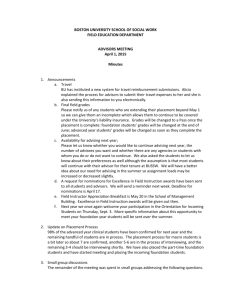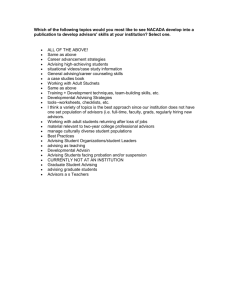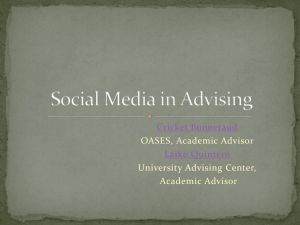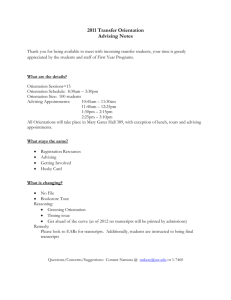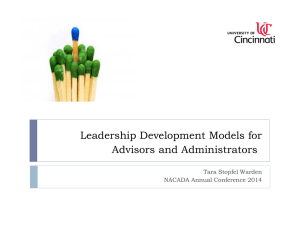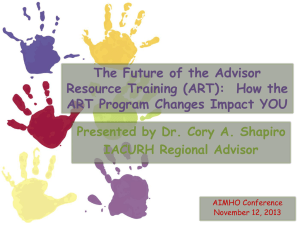Advising Syllabus - St. Norbert College
advertisement
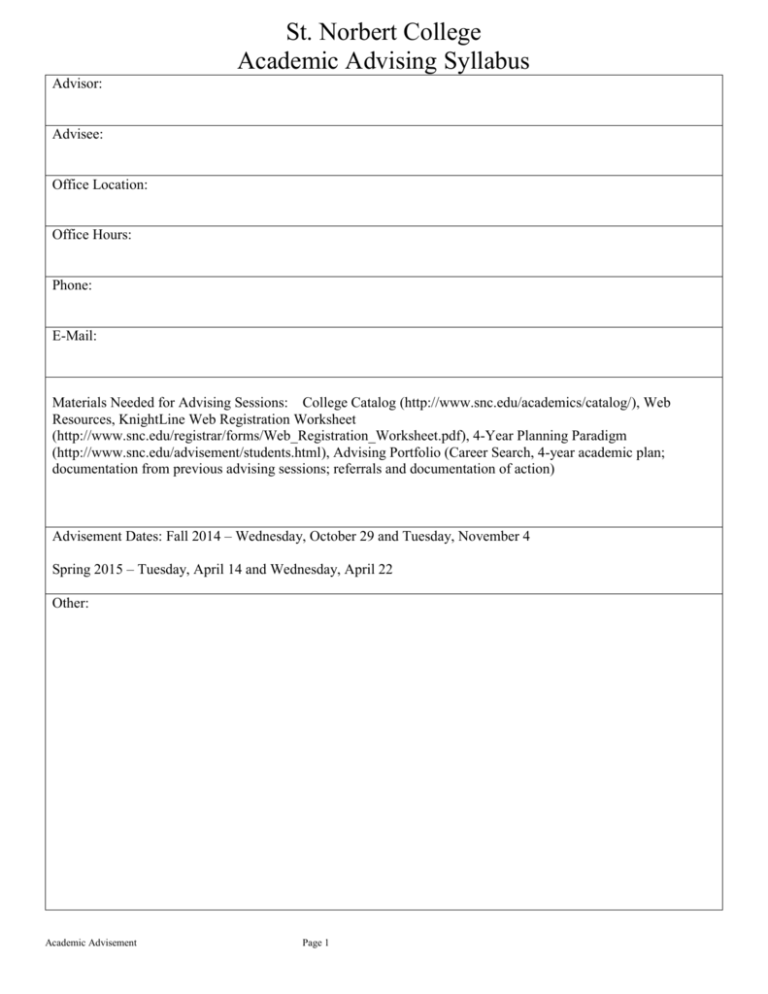
St. Norbert College Academic Advising Syllabus Advisor: Advisee: Office Location: Office Hours: Phone: E-Mail: Materials Needed for Advising Sessions: College Catalog (http://www.snc.edu/academics/catalog/), Web Resources, KnightLine Web Registration Worksheet (http://www.snc.edu/registrar/forms/Web_Registration_Worksheet.pdf), 4-Year Planning Paradigm (http://www.snc.edu/advisement/students.html), Advising Portfolio (Career Search, 4-year academic plan; documentation from previous advising sessions; referrals and documentation of action) Advisement Dates: Fall 2014 – Wednesday, October 29 and Tuesday, November 4 Spring 2015 – Tuesday, April 14 and Wednesday, April 22 Other: Academic Advisement Page 1 Academic Advising at St. Norbert College Advising Mission Statement-Purpose Academic Advising is an integral part of undergraduate education. The goal of all academic advising is to assist students in taking responsibility for developing meaningful educational plans compatible with their potential and with their career and life goals. Advising is more than the imparting of specialized information; it includes helping students formulate important questions about the nature and direction of their education and helping them find answers to those questions. Academic advisors confer with students regarding course schedules and educational experiences, but students themselves are responsible for selecting the content of their academic program and making progress towards an academic degree. As students progress through their academic program, their advising needs change. St. Norbert College provides academic advisors to meet students’ ongoing and multifaceted needs. Depending on their particular needs and interests, students may see a variety of individuals to assist them through their academic career. Faculty/Staff academic advisors are key to understanding the nature of the academic program and how it can address student interest and goals. Academic advisors maintain up-to-date information on academic policies and procedures and deadlines. In addition, support offices/services such as Academic Support Services, Career Services, Health and Wellness Center, Campus Ministry, and the Writing Center are good resources for helping refine academic interest and goals and providing academic support to be successful. Deliberate and intentional academic advising at St. Norbert College guides students in making responsible academic and career choices, setting goals, and developing educational plans to realize those goals. Effective advising fosters critical thinking and informed decision making which supports meaningful living in a global society. Academic Advisement is a process that begins when a student enrolls at St. Norbert and continues through graduation. First-year students meet with faculty advisors at Summer Orientation. Students are assigned to their permanent academic advisors at the beginning of their first semester. The role of academic advisors is to help students clarify goals, career options, courses of study, program requirements, educational needs, and identify College resources that support the academic goals. Academic advisors regularly interact with their advisees in order to coordinate educational experiences and to monitor student progress throughout the year. While in the final analysis, academic choices rest with the student, faculty advisors assist students by helping them identify and assess the alternatives and the consequences of academic decisions. Expected Student Learning Outcomes for the Advising Experience (Council for the Advancement of Standards in Higher Education) Students will Value the role of the academic advising process in the College experience Demonstrate the characteristics of a prepared advisee With the guidance of an academic advisor, make effective decisions concerning their academic and career goals Develop an educational plan for successfully achieving their goals; select courses each semester to progress toward fulfilling that educational plan Know the general education requirements and appreciate the liberal arts values reflected in the General Education Program Use campus resources and services to assist them in achieving their academic, personal, and career goals. Follow through when referred to appropriate campus resources Graduate in a timely manner based on the individual educational plan Academic Advisement Page 2 Responsibilities Academic advising is a collaborative educational process; students and their advisors are partners in meeting the essential learning outcomes that support student success. The partnership requires participation and involvement of both the advisor and the student and spans the student’s whole educational experience at St. Norbert. In this partnership both the advisor and advisee have well-defined responsibilities. Academic Advisor Responsibilities—What You Can Expect You can expect your advisor to Effectively communicate the curriculum and graduation requirements for your major and college academic policies and procedures Encourage and guide students as they define and develop realistic goals Encourage and support students as they make academic progress according to their educational plans Provide students with information about strategies for using the available resources and services on campus Assist students in understanding the purposes and goals of higher education and its effects on their lives and personal goals Monitor and accurately document students’ progress toward meeting their goals Be accessible for advising students in meetings either in groups or individually during posted office hours, by telephone, e-mail, or web access. Assist students in gaining decision-making skills and skills in assuming responsibility for their educational plans and achievements Maintain confidentiality Assist students in working closely with their professors and refer you to appropriate College sources as assistance is needed Advisee Responsibilities—What Your Advisor Can Expect As an advisee, you have clear responsibilities in the advising partnership in order to be successful: Schedule regular appointments or make regular contacts with advisor during each semester Come prepared to each appointment with questions or materials for discussion; Take your advising portfolio to advising sessions in which your progress will be assessed and a course of study for the following semester will be planned Be an active learner by participating fully in the advising experience Ask questions if you do not understand an issue or have a specific concern Enroll in the courses for which you and your advisor have determined that from educational objectives you are ready to pursue. Keep a personal record of your progress toward meeting your goals. Organize official documents in an advising portfolio that enables you to access them when needed Complete all assignments or recommendations from your advisor Gather all relevant decision-making information Clarify personal values and goals and provide advisor with accurate information regarding your interests and abilities Become knowledgeable about college programs, policies, and procedures Accept responsibility for your decisions Assistance with Issues Involving Disabilities In keeping with the St. Norbert College mission to help students develop their full potential, and in compliance with the Americans with Disabilities Act, the College provides supportive services to students with disabilities. For enquiries and further details, please visit the Academic Support Services office located on the upper level of Todd Wehr Hall or Corey Ciesielczyk, Coordinator of Services to Students with Disabilities (Phone: 403-3874), or visit the website http://www.snc.edu/academicsupport/accommodation/ Academic Advisement Page 3 Below are broad issues each student will grapple with during college. Discuss ways you can achieve these outcomes with your academic advisor. FIRST YEAR Explore your academic and career interests. Explore interpersonal factors (interests, personality) related to academic and career goals. Make sound decisions regarding courses. Clarify your personal values, especially as they relate to academic and career choices. Assess your skills and strengths. Meet with the advisor in the major (s) that you’re pursuing. SECOND YEAR Continue assessing your skills, strengths, and interests. Explore connections between your interests and strengths and potential careers. Arrange for experiences that will help you clarify your goals and interests including part-time employment, meeting with faculty and appropriate staff, shadowing a professional in a field of interest to you, studying abroad, volunteering, or applying for internships. Be able to articulate what you’re studying and why. THIRD YEAR Make decisions – it’s a lifelong skill! Discover how your interests and skills apply to the world of work. Research multiple career options to find best fit. Network with at least three people who work in a field of interest to you. Identify educational and/or additional skills you will need to attain employment or training in your field. Is graduate (or professional) school for you? FOURTH YEAR. Research employment or graduate school options and start applying. Understand skills that employers and graduate schools seek. Be able to market your skills and education to employers. Continue networking. Continue assessing your options. Notes: Academic Advisement Page 4
